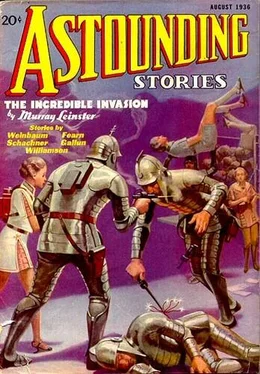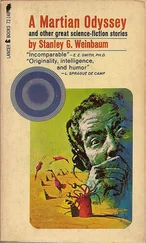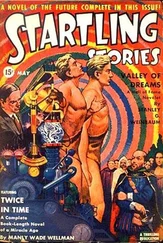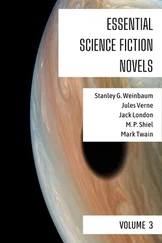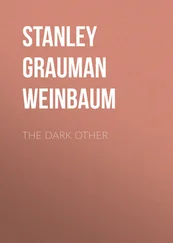Stanley Weinbaum - Proteus Island
Здесь есть возможность читать онлайн «Stanley Weinbaum - Proteus Island» весь текст электронной книги совершенно бесплатно (целиком полную версию без сокращений). В некоторых случаях можно слушать аудио, скачать через торрент в формате fb2 и присутствует краткое содержание. Жанр: Фантастика и фэнтези, на английском языке. Описание произведения, (предисловие) а так же отзывы посетителей доступны на портале библиотеки ЛибКат.
- Название:Proteus Island
- Автор:
- Жанр:
- Год:неизвестен
- ISBN:нет данных
- Рейтинг книги:3 / 5. Голосов: 1
-
Избранное:Добавить в избранное
- Отзывы:
-
Ваша оценка:
- 60
- 1
- 2
- 3
- 4
- 5
Proteus Island: краткое содержание, описание и аннотация
Предлагаем к чтению аннотацию, описание, краткое содержание или предисловие (зависит от того, что написал сам автор книги «Proteus Island»). Если вы не нашли необходимую информацию о книге — напишите в комментариях, мы постараемся отыскать её.
Proteus Island — читать онлайн бесплатно полную книгу (весь текст) целиком
Ниже представлен текст книги, разбитый по страницам. Система сохранения места последней прочитанной страницы, позволяет с удобством читать онлайн бесплатно книгу «Proteus Island», без необходимости каждый раз заново искать на чём Вы остановились. Поставьте закладку, и сможете в любой момент перейти на страницу, на которой закончили чтение.
Интервал:
Закладка:
Carver came suddenly upon a narrow tidal arm into which dropped a tinkling trickle of water from a granite ledge at the verge of the jungle. He stooped, moistened his finger, and tasted it. It was brackish but drinkable, and therefore quite satisfactory. He could hardly expect to find a larger stream on Austin, since the watershed was too small on an island only seven miles by three. With his eyes he followed the course of the brook up into the tangle of fern forest, and a flash of movement arrested his eyes. For a moment he gazed in complete incredulity, knowing that he couldn't possibly be seeing — what he was seeing!
The creature had apparently been drinking at the brink of the stream, for Carver glimpsed it first in kneeling position. That was part of the surprise — the fact that it was kneeling — for no animal save man ever assumes that attitude, and this being, whatever it might be, was not human.
Wild, yellow eyes glared back at him, and the thing rose to an erect posture. It was a biped, a small travesty of man, standing no more than twenty inches in height. Little clawed fingers clutched at hanging creepers. Carver had a shocked glimpse of a body covered in patches with ragged gray fur, of an agile tail, of needle-sharp teeth in a little red mouth. But mostly he saw only malevolent yellow eyes and a face that was not human, yet had a hideous suggestion of humanity gone wild, a stunning miniature synthesis of manlike and feline characteristics. Carver had spent much time in the wastelands of the planet. His reaction was almost in the nature of a reflex, without thought or volition; his blue-barreled gun leaped and flashed as if it moved of itself. This automatism was a valuable quality in the wilder portions of the earth; more than once he had saved his life by shooting first when startled, and reflecting afterward. But the quickness of the reaction did not lend itself to accuracy.
His bullet tore a leaf at the very cheek of the creature. The thing snarled, and then, with a final flash of yellow flame from its wild eyes, leaped headlong into the tangle of foliage and vanished.
Carver whistled. "What in Heaven's name," he muttered aloud, "was that?" But he had small time for reflection; long shadows and an orange tint to the afternoon light warned that darkness — sudden, twilightless darkness — was near. He turned back along the curving beach toward the outrigger.
A low coral spit hid the craft and the two Maoris, and the ridge jutted like a bar squarely across the face of the descending sun. Carver squinted against the light and trudged thoughtfully onward — to freeze into sudden immobility at the sound of a terrified scream from the direction of the proa!
He broke into a run. It was no more than a hundred yards to the coral ridge, but so swiftly did the sun drop in these latitudes that dusk seemed to race him to the crest. Shadows skittered along the beach as he leaped to the top and stared frantically toward the spot where his craft had been beached.
Something was there. A box — part of the provisions from the proa. But the proa itself — was gone!
Then he saw it, already a half dozen cables' lengths out in the bay. Malloa was crouching in the stern, Kolu was partly hidden by the sail, as the craft moved swiftly and steadily out toward the darkness gathering in the north.
His first impulse was to shout, and shout he did. Then he realized that they were beyond earshot, and very deliberately, he fired his revolver three times. Twice he shot into the air, but since Malloa cast not even a glance backward, the third bullet he sent carefully in the direction of the fleeing pair. Whether or not it took effect he could not tell, but the proa only slid more swiftly into the black distance.
He stared in hot rage after the deserters until even the white sail had vanished; then he ceased to swear, sat glumly on the single box they had unloaded, and fell to wondering what had frightened them. But that was something he never discovered.
Full darkness settled. In the sky appeared the strange constellations of the heaven's under hemisphere; southeast glowed the glorious Southern Cross, and south the mystic Clouds of Magellan. But Carver had no eyes for these beauties; he was already long familiar with the aspect of the Southern skies.
He mused over his situation. It was irritating rather than desperate, for he was armed, and even had he not been, there was no dangerous animal life on these tiny islands south of the Aucklands, nor, excepting man, on New Zealand itself. But not even man lived in the Aucklands, or on Macquarie, or here on remote Austin. Malloa and Kolu had been terrifically frightened, beyond doubt; but it took very little to rouse the superstitious fears of a Polynesian. A strange species of bat was enough, or even a kiwi passing in the shadows of the brush, or merely their own fancies, stimulated by whatever wild tales had ringed lonely Austin Island with taboos.
And as for rescue, that too was certain. Malloa and Kolu might recover their courage and return for him. If they didn't, they still might make for Macquarie Island and the Fortune expedition. Even if they did what he supposed they naturally would do — head for the Aucklands, and then to their home on the Chathams — still Jameson would begin to worry in three or four days, and there'd be a search made.
There was no danger, he told himself — nothing to worry about. Best thing to do was simply to go about his work. Luckily, the box on which he sat was the one that contained his cyanide jar for insect specimens, nets, traps, and snares. He could proceed just as planned, except that he'd have to devote some of his time to hunting and preparing food.
Carver lighted his pipe, set about building a fire of the plentiful driftwood, and prepared for the night. He delivered himself of a few choice epithets descriptive of the two Maoris as he realized that his comfortable sleeping bag was gone with the proa, but the fire would serve against the chill of the high Southern latitude. He puffed his pipe reflectively to its end, lay down near his driftwood blaze, and prepared to sleep.
When, seven hours and fifty minutes later, the edge of the sun dented the eastern horizon, he was ready to admit that the night was something other than a success. He was hardened to the tiny, persistent fleas that skipped out of the sand, and his skin had long been toughened to the bloodthirsty night insects of the islands. Yet he had made a decided failure at the attempt to sleep.
Why? It surely couldn't be nervousness over the fact of strange surroundings and loneliness. Alan Carver had spent too many nights in wild and solitary places for that. Yet the night sounds had kept him in a perpetual state of half-wakeful apprehension, and at least a dozen times he had started to full consciousness in a sweat of nervousness. Why?
He knew why. It was the night sounds themselves. Not their loudness nor their menace, but their — well, their variety . He knew what darkness ought to bring forth in the way of noises; he knew every bird call and bat squeak indigenous to these islands. But the noises of night here on Austin Island had refused to conform to his pattern of knowledge. They were strange, unclassified, and far more varied than they should have been; and yet, even through the wildest cry, he fancied a disturbing note of familiarity.
Carver shrugged. In the clear daylight his memories of the night seemed like foolish and perverse notions, quite inexcusable in the mind of one as accustomed to lonely places as himself. He heaved his powerful form erect, stretched, and gazed toward the matted tangle of plant life under the tree ferns.
He was hungry, and somewhere in there was breakfast, either fruit or bird. Those represented the entire range of choice, since he was not at present hungry enough to consider any of the other possible variations — rat, bat, or dog. That covered the fauna of these islands.
Читать дальшеИнтервал:
Закладка:
Похожие книги на «Proteus Island»
Представляем Вашему вниманию похожие книги на «Proteus Island» списком для выбора. Мы отобрали схожую по названию и смыслу литературу в надежде предоставить читателям больше вариантов отыскать новые, интересные, ещё непрочитанные произведения.
Обсуждение, отзывы о книге «Proteus Island» и просто собственные мнения читателей. Оставьте ваши комментарии, напишите, что Вы думаете о произведении, его смысле или главных героях. Укажите что конкретно понравилось, а что нет, и почему Вы так считаете.
